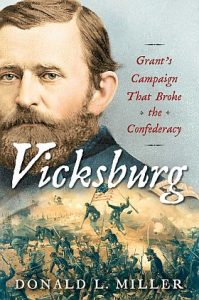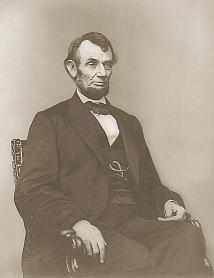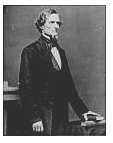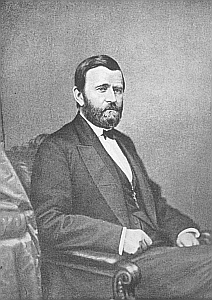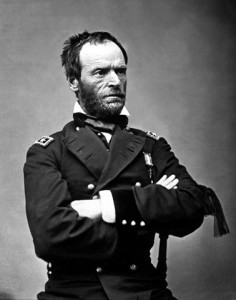Vicksburg – Grant’s Campaign That Broke the Confederacy by Donald L. Miller
Vicksburg Is The Key To The Control Of The Mississippi River
The Mississippi River was a water highway of commerce during Civil War times just as today. The big and muddy river flows for over two thousand miles from its source at Lake Itasca, Minnesota on its way to New Orleans and its mouth in the Gulf of Mexico. The Mississippi River is nicknamed ”Old Man River” and the “Father of Waters” but it gets its name of Mississippi from a French interpretation of “Anishinaabe” which is a Native American name for the river of Misi-ziibi, which means Great River.
“The war can never be brought to a close until that key is in our pocket.”
“See…what a lot of land these fellows hold, of which Vicksburg is the key. Here is Red River which will supply the Confederates with cattle and corn to feed their armies. There are the Arkansas and White Rivers, which can supply cattle and hogs by the thousand. From Vicksburg these supplies can be distributed by rail all over the Confederacy. Then there is the giant depot of supplies on the Yazoo. Let us get Vicksburg and all that country is ours. The war can never be brought to a close until that key is in our pocket. I am acquainted with that region and know what I am talking about.”
…President Abraham Lincoln explaining how important Vicksburg was to the Confederacy. Lincoln was pointing at a large wall map in General George B. McClellan’s headquarters during a secret planning meeting to take New Orleans with Rear Admiral David Dixon Porter and General McClellan.
Vicksburg Holds the South’s Halves Together
“the nailhead that held the South’s two halves together.”
… Confederate President Jefferson Davis regarding Vicksburg.
General Ulysses S. Grant was on a campaign in 1863 to take Vicksburg, Mississippi. If Grant could take Vicksburg and Port Hudson to the south, which comparatively would not be much of a challenge, then the Union would have control of the Mississippi River. Without possession of Vicksburg and control of the Mississippi River the Confederacy would be strangled, it would be deprived of food and fodder needed to supply its soldiers and war efforts in the east. Without Vicksburg and the Mississippi River transportation of vital food such as beef, hogs, corn, rice, and men, arms, ammunition, medicines, and clothing needed to provide the strong armies of Braxton Bragg and Robert E. Lee would be lost. The Confederacy would be cut in half as Confederate President Jefferson Davis said, with the western Confederate states of Texas, Arkansas, and Louisiana and all their rich resources cut off and blocked from the Confederate armies and states to the east of the Mississippi River.
The loss of Vicksburg would also mean the loss of the vital Southern Mississippi Railroad, another major supply route connecting the western and eastern sections of the Confederacy, which ran from Vicksburg through Jackson. Loss of this railroad would greatly cripple the Confederacy’s war effort. With Vicksburg and the Mississippi River in its control the Confederacy would have the backbone of transportation and resources required to successfully wage war against the Union. President Abraham Lincoln correctly said, “We can take all the northern ports of the Confederacy, and they can defy us from Vicksburg. It means hog and hominy without limit, fresh troops from all the states of the far South, and a cotton country where they can raise the staple without interference.” Lincoln knew Vicksburg was the key. So did Ulysses S. Grant.
A Sampling Of Stories From Vicksburg
An Introduction To Ulysses S. Grant
|
Ulysses S. Grant And The Battle of Belmont
|
An Introduction To William Tecumseh Sherman
|
“Thank God, the Father of Waters again goes unvexed to the sea.”
… President Abraham Lincoln upon learning that General Ulysses S. Grant had taken Vicksburg on July 4, 1863.
VICKSBURG Audiobook Excerpt by Simon & Schuster:
* Audio via Soundcloud
Vicksburg Contents
Vicksburg tells the story of Ulysses S. Grant taking Vicksburg and the Mississippi River for the Union in four main parts with a total of twenty-three chapters. Listed here is the Contents of Vicksburg so you may see what a full and complete work of 688 pages it is:
Author’s Note
Prologue
— PART ONE —
Chapter 1 Cairo
Chapter 2 River Warrior
Chapter 3 Winter Fortress
Chapter 4 A Tremendous Murder Mill
— PART TWO —
Chapter 5 “The Battle for the Mississippi”
Chapter 6 “These Troublous Times”
Chapter 7 Secessionist Citadel
Chapter 8 Rebel Victory
— PART THREE —
Chapter 9 Anxiety and Intrigue
Chapter 10 Revolution
Chapter 11 Grant’s March
Chapter 12 The Chickasaw Slaughter Pen
Chapter 13 Mud and Misery
Chapter 14 “Things Fall Apart. . .”
Chapter 15 Steele’s Bayou
Chapter 16 Crisis
Chapter 17 The Entering Wedge
Chapter 18 This One Object
— PART FOUR —
Chapter 19 Pursuit
Chapter 20 The Hill of Death
Chapter 21 A Circle of Fire
Chapter 22 “The Crisis in on Us”
Chapter 23 “It is Great, Mr. Wells”
Epilogue
Appendix: Vickburg Battlefield Casualties
Acknowledgements
Notes
Bibliography
Illustration Credits
Index
My Recommendation of Vicksburg – Grant’s Campaign That Broke the Confederacy
Vicksburg – Grant’s Campaign That Broke the Confederacy by Donald L. Miller is an authoritative, complete, engaging, and enjoyable to read book about an important Civil War campaign that has not received enough attention. Author Donald L. Miller fixes that. Miller brings to Grant’s Vicksburg campaign the attention and explanation that it needs and deserves. Miller’s effort with Vicksburg brings to the reader all the rich and crucial history of Ulysses S. Grant’s Vicksburg campaign. You are certainly familiar with the Union victory at the Battle of Gettysburg which ended July 3, 1863, but Gettysburg is only one half of the great and important Union victories in early July 1863. Grant’s victory at Vicksburg on July 4, 1863, is the other great and important half of the full story.
Vicksburg belongs on a shelf in a bookcase in every personal or formal Civil War library. It belongs on the same Civil War book shelf where other major titles such as Battle Cry of Freedom by James McPherson, The Civil War: A Narrative by Shelby Foote, the Army of the Potomac trilogy by Bruce Catton, the Centennial History of the Civil War by Bruce Catton, the Ulysses S. Grant trilogy by Bruce Catton, Hard Tack and Coffee by John D. Billings, and the four volumes of Battles and Leaders of the Civil War reside, it ranks in prestige with them. Vicksburg – Grant’s Campaign That Broke the Confederacy by Donald L. Miller joins the book club of the best of the best of Civil War books.
Vicksburg is a book to read and reread. I suggest you add your own generous notes, thoughts, underlines, and highlights to the pages as you read about Ulysses S. Grant’s successful campaign to take Vicksburg and the Mississippi River for the Union. Use this book up. Write in it. Let the pages get bent or torn from many reading sessions. It’s fine if you occasionally drip your coffee or wine on a page, or have finger smudges in it. Those book page-reading battle scars are proof that you are enjoying and learning from Vicksburg. Have all that happen because you are reading a book that will reward you with great Civil War history story-telling of one of the most important campaigns of the Civil War.
Grant’s victory at Vicksburg was a major factor of the Union winning the Civil War, the United States remaining united, and freedom coming to those held in bondage. I believe most Civil War historians and students would say that the Battle of Gettysburg has overshadowed Vicksburg in the amount of attention and importance it has received. There is no doubt that both battles are important, very important in the outcome of the Civil War. But now with Donald L. Miller’s Vicksburg – Grant’s Campaign That Broke the Confederacy this western battle gets the attention and importance it deserves. We are privileged to have such an esteemed author and historian as Donald L. Miller write this book. Vicksburg will become a Civil War standard.
If you wear your copy of Vicksburg out with your notes, underlines, highlights, and other page-reading battle scars, then buy another. It’s that good.
…Jonathan R. Allen
Author Donald L. Miller
Vicksburg – Grant’s Campaign That Broke the Confederacy author Donald L. Miller comes to the subject of the Civil War with a qualified and rich background as a writer, historian, educator, and lecturer. Miller has written ten books including these:
- Masters of the Air: America’s Bomber Boys Who Fought the Air War Against Nazi Germany
- Supreme City: How Jazz Age Manhattan Gave Birth to Modern America
- City of the Century: The Epic of Chicago and the Making of America
- The Kingdom of Coal: Work, Enterprise, and Ethnic Communities in the Mine Fields (with Richard E. Sharpless)
- Lewis Mumford: A Life
- D-Days in the Pacific
- The Story of World War II (with Henry Steele Commager)
A Few Of Donald L. Miller’s Many Honors And Achievements
- His book Masters of the Air will become a Steven Spielberg and Tom Hanks television series.
- The John Henry MacCracken Professor of History Emeritus at Lafayette College.
- He has been the host, co-producer, or the historical consultant for more than thirty television documentaries.
- His depth of knowledge of United States history makes him one of our most respected historians and authorities on World War II, the Civil War, and Modern United States History.
- PBS and HBO have used Miller as a consultant and adviser on historical productions.
- He has written for The New York Times and The Washington Post.
- Miller has won six awards for excellence in teaching and five fellowships from the National Endowment for the Humanities.
- He was the resident scholar at All Souls College, Oxford, and the Crayenborgh Lecturer at Leiden University, The Netherlands.
- Both the United States State Department and the Smithsonian Institution have had Miller as a lecturer.
Book Information
Title: Vicksburg – Grant’s campaign That Broke the ConfederacyAuthor: Donald L. Miller
Publisher: Simon & Schuster, October 29, 2019
Pages: 688
Book Dimensions: 6″ x 1.4″ x 9″
ISBN-13: 978-1451641370
ISBN-10: 1451641370
Price: Hardcover: $35.00, Ebook: $16.99, Audio Download: $29.99
Where To Buy/order:
You can find Vicksburg at your local bookstore and online:
Simon & Schuster
Amazon
Barnes & Noble
Books-A-Million
Google Play
Apple Books
Kobo
Editorial Reviews
“A quarter of a million slaves lived in the lower Mississippi Valley when the Civil War broke out. In Donald Miller’s Vicksburg, we learn not only the story of the war’s great western turning point, but how Ulysses S. Grant evolved into a military emancipator of most of those African Americans and therefore with time crushed the Confederacy. Carefully researched and written with sizzling and persuasive prose, Miller has found the way to write both military and emancipation history in one profound package. Never have headquarters, slave quarters, and the ultimate purpose of the war been so seamlessly and brilliantly demonstrated.” …David W. Blight, Pulitzer Prize-winning Author of Frederick Douglass: Prophet of Freedom.
“The fullest and best history of the Vicksburg campaign.” …James M. McPherson, Pulitzer Prize-winning author of Battle Cry of Freedom: The Civil War Era and The War That Forged a Nation..
“This is a magnificent book, certainly one of the very best ever written about the Civil War. It has breadth and depth, and it is written in a way that makes the reader truly understand not only the battle and siege of Vicksburg, not only the Civil War, but war itself.” …John M. Barry, author of Rising Tide.
“Readers will marvel at how Grant—a washed-up dry-goods clerk at the beginning of the Civil War—acquires the power and skill that made him the mastermind at Vicksburg of the largest amphibious army-navy operation staged by the U.S. military until D-Day. In a narrative taut with drama, Miller recounts how this resolute Union crusader takes the war down the Mississippi. . . . War history alive with probing intelligence and irresistible passion.”, …Booklist
“Miller deftly conjures the campaign’s uncertainty and drama—the surprises that lay around every bend of the region’s forbidding terrain and swampy waterways. At the heart of his story is U.S. Grant, who emerges here as a master of maneuver and improvisation, and a hero made human and real. This is military history at its best.” …Elizabeth R. Varon, author of Armies of Deliverance: A New History of the Civil War.
“This superbly written narrative is a portrait of America’s greatest soldier, warts and all, an accounting of Grant’s moral evolution on the slave question, of his many tactical gambles and errors, as well as his strategic triumph in the decisive campaign of America’s most important war. We also meet ordinary soldiers, hear the iron dice roll, smell swamps and river lands that impede key logistics in the far-flung Western theater, feel the summer heat and thickly humid air. Most remarkably, we are guided up and down the Mississippi over the course of the greatest amphibious campaign of the 19th century.” …Cathal J. Nolan, author of The Allure of Battle.
“Grant has had his biographers over the years, but in Miller he has finally found a writer who captures him in his completeness as a man and a military leader, overcoming heavy odds and repeated failures to win the decisive campaign of the war.” …Rob Citino, Executive Director, Institute for the Study of War and Democracy, and Samuel Zemurray Stone Senior Historian, The National World War II Museum.
